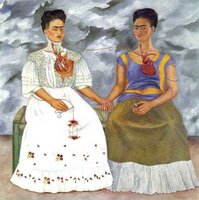I will have been disabled for ten years this summer, but for most of this period, I have rejected the term. I am not talking about a reluctance to declared from the rooftops that I am a disabled person, but the vehement denial of that fact. I suppose this means that some of the very first experiences of disablism came from myself; in my mind, being disabled meant all sorts of negative things I did not wish to take on board.
And whilst perhaps disabled people may only wear their disabled hat in certain circumstances, whenever I hear anyone actually deny it, I hear
I am not like them.
and I sympathise.
When I got sick, I knew the role I had to play. At that point, I was not yet acquainted with the great sociologist Talcott Parsons and The Sick Role, but this is exactly what was happening. Parsons described the way we and people around us understand and respond to illness. In simply terms, illness allows you to be exempt from certain roles and responsibilities. This exemption is conditional both on the active desire to regain health and legitimisation via doctors and other professionals.
The fact is that most people who get ill in some way have a period of reduced activity, undergo some form of medical treatment or therapy and then they get better again; a clear-cut happy ending. Others die; a clear-cut unhappy ending. Adopting the sick role is a perfectly rational way to respond to a short term crisis of health.
 Only some people get sick and stay sick and this is where this where the real limitations of our response to illness begin to show. Exemptions from activities can become exclusions; if you can’t work, socialise or exercise in the normal way, you can’t work, socialise or exercise at all. Legitimisation becomes harder as colleagues, family, friends and even doctors lose patience with a problem that just goes on and on. Sooner or later someone will suggest you pull yourself together. And when an illness continues for years, the pursuit of unobtainable health can become a deeply demoralising one.
Only some people get sick and stay sick and this is where this where the real limitations of our response to illness begin to show. Exemptions from activities can become exclusions; if you can’t work, socialise or exercise in the normal way, you can’t work, socialise or exercise at all. Legitimisation becomes harder as colleagues, family, friends and even doctors lose patience with a problem that just goes on and on. Sooner or later someone will suggest you pull yourself together. And when an illness continues for years, the pursuit of unobtainable health can become a deeply demoralising one.Melodramatic as it may sound, I found myself so frustrated with my failure to either defeat or be killed by my particular disease that I contemplated bringing about an unhappy ending myself. My choice to go on living meant breaking the rules and finding a way to move on without any resolution to this particular crisis. In fact, I needed to stop regarding it as a crisis altogether; illness is unpleasant and has its pitch-black moments, but it doesn’t need to be a constant, all-consuming challenge once you have lived with it for a good while.
So I began to ditch what Talcott Parsons described as illness behaviours; from now on I was going to differentiate between what my illness actually prevented me from doing and those things which I wasn’t doing because I was waiting to get better or didn’t feel I ought to do so long as I was ill.
 I had thought that I only got out of the house so rarely because I was sick and my pain greatly limited the distances I could walk. A wheelchair solved this problem. I had thought that my education was on hold for as long as I was too ill to do full time study at a specific location. The Open University solved this problem. Suddenly I was finding new ways of doing most of the things which we consider important for quality of life; having an occupation, being able to socialise, having a certain amount of independence from my family. Life very much improved
I had thought that I only got out of the house so rarely because I was sick and my pain greatly limited the distances I could walk. A wheelchair solved this problem. I had thought that my education was on hold for as long as I was too ill to do full time study at a specific location. The Open University solved this problem. Suddenly I was finding new ways of doing most of the things which we consider important for quality of life; having an occupation, being able to socialise, having a certain amount of independence from my family. Life very much improvedHowever, it was at this point that I found myself with an entirely different set of obstacles I had never been confronted with before. Previously, my every problem had been blamed on my illness, but now I saw that while some of my limitations could be put at its door, some of them were my own doing and some of them were to do with the way other people behaved, the way that the world had been built with agile legs in mind, the way that systems designed to serve me actually held me down.
I was disabled. By myself, by society and the environment we had created for ourselves.
And I was cross, to be honest. I had thought that I was the problem.
And then, to compound my anger, I found that most of the people around me still felt that it was basically me, as host to an unremitting disease, which was the problem. I could document the many different skirmishes I had with both myself and others in my struggle to move on from this identity. The same arguments were made against every step from my getting a blue badge to my purchase of a laptop computer so that I could work from bed.
 And the ultimate manifestation of all this was accepting that I am a disabled person. Accepting that label and being prepared to use it. To talk about it. To communicate with other disabled people who had very different sorts of conditions and impairments but faced very similar obstacles because we are all regarded in much the same way.
And the ultimate manifestation of all this was accepting that I am a disabled person. Accepting that label and being prepared to use it. To talk about it. To communicate with other disabled people who had very different sorts of conditions and impairments but faced very similar obstacles because we are all regarded in much the same way.But disabled… Don’t call yourself that, people said. Why not, you ask?
You would be setting yourself apart as “other”.
I am not someone who wishes to draw attention to myself, especially not for a set of limitations which I have no control over. I would really rather have the option to go unnoticed.
 However, whatever I do I am set apart as “other”. If I don’t use a wheelchair, I don’t leave the house. Never going out into the world is pretty much as other as a person can get.
However, whatever I do I am set apart as “other”. If I don’t use a wheelchair, I don’t leave the house. Never going out into the world is pretty much as other as a person can get.But if I go out in a wheelchair, I am regarded totally “other”. There are all sorts of places and modes of transport from which I am excluded. I am treated differently by some of the people I encounter; I may be stared at or ignored completely, I am spoken down to or else addressed through a person that I am with. I embarrass people, just going about doing ordinary things.
Calling myself disabled is not an assertion that I want differential treatment.
Calling myself disabled is an assertion that I am already in receipt of differential treatment.
You would be giving up.
Even after ten years of incapacitating illness, you would be surprised how many people regard me as defeatist for regarding this as a long-term situation and for being largely disinterested in the miracle cure they read about that involves eating nothing but cabbage and sherbet for six months.
Even when you can only walk a few metres, people will warn you of the dangers of using a wheelchair; you will become dependent on it, they say; you will give up. In truth of course societal attitudes and the built environment means that life is very much easier on foot and I would never use the wheelchair on journeys I could manage on my feet.
 When you know your limitations and are determined to work within them, to avoid a relapse in health, a public collapse and inconvenience to others, then you are still advised to throw caution to the wind, to let your hair down and to hell with the consequences. They are my consequences and I know them only too well.
When you know your limitations and are determined to work within them, to avoid a relapse in health, a public collapse and inconvenience to others, then you are still advised to throw caution to the wind, to let your hair down and to hell with the consequences. They are my consequences and I know them only too well.You would be denying your abilities
Many people have thought to tell me that they don’t think of me as disabled. Like it is a compliment. One close friend actually said, “I don’t think of you as disabled, because you are more intelligent that most normal people.” I was a little too stunned to muster any of the myriad comebacks that have since occurred to me.
Experiencing disability is not to do with experience some sort of global incapacity. Disabled people can be highly intelligent. They can also have severe intellectual impairments. Disabled people can be extremely physically fit, or they may have very limited physical capacity. (Oh dear, I’ll be rewriting Lady Bracknell's One in Seven if I’m not careful).
You take my point; there is nothing about being disabled which says there is anything in particular I can’t do. I have many skill and talents. Being disabled just means that there are some things which I am prevented from doing. To say that in your opinion, I am not prevented from doing these things, is not going to make me feel any better when I am awarded a free bus pass, anywhere in the county, only I can’t physically get onto a bus.
I found all this quite difficult to write. I think I would have been quite dissatisfied with anything I could have written for today (and it is actually May 1st as I am trying to finish this). A certain young man was spot-on about performance anxiety. But also, it is hard because I am describing a struggle which is ongoing.
 I still feel I must constantly defend the fact that I am not preoccupied with my health; that I have called off the search for a miracle cure. I still feel I must constantly argue that it is not all right to exclude me, it is not all right to value my life, my skills, my needs and desires any less than anyone else’s. It is not all right to consider me as passive and dependent, to judge me as deserving or undeserving of things which other people take for granted.
I still feel I must constantly defend the fact that I am not preoccupied with my health; that I have called off the search for a miracle cure. I still feel I must constantly argue that it is not all right to exclude me, it is not all right to value my life, my skills, my needs and desires any less than anyone else’s. It is not all right to consider me as passive and dependent, to judge me as deserving or undeserving of things which other people take for granted.A happy ending, of sorts, arrived when I realised that it is possible to have a full and interesting life within the limitations of ill health, and to realise that very many of the obstacles I face are not my sole responsibility. What’s more, in theory at least, this means that very many of the obstacles I face are moveable ones; they may shift if enough of us push hard. Which, regardless of what happens to my health, would be a very happy ending indeed.
Hmm. I think that’s the best I can manage. The post, I mean.
List of Art and Artists (they all have something in common)
(left) Starry Night by Vincent Van Gogh
(right) The Two Friedas by Frieda Kahlo
(left) The Umbrellas by Auguste Renoir
(right)Untitled 2000 by Allison Lapper
(left) Aurora by Mark di Suvero
(right) A sign from The Way Ahead, a collaborative project by disabled people run by disabled artist Caroline Cardus for Inter Action. See some more of the exhibition on the BBC News website.
Technorati Tags: Blogging Against Disablism, disablism, ableism, disability, chronic illness, art
11 comments:
I've just found your blog, I found myself nodding so often at what you say.
I didn't realise that there was a blogging against disablism day or I would have offered to write something or get involved.
Now I'll have to read all your blog... That's no hardship though you write very well.
Thanks for that as per usual wonderful piece Goldfish. No note your usual wonderful piece! You have surpassed yourself here. And a big thank you for getting this whole thing on the road!
love
pete
I agree to Pete. I keep browsing through all kind of blogs. It was a wonderful idea and it is just great to see how well it has worked out, isn't it?
A great selection of art here, Goldfish. I really like the motorway sign.
Arrg - typed in a whole comment then leant on the wrong bloody key and deleted the lot!!!
Anyway, great peice!!
Am struggling a bit to write my own entry, fatigue and pain issues getting in the way. Maybe next year it should be over a week rather than just a day, reality of life with a disability being that sometimes things take longer and a day is rather a short window of time. The acronym wouldn't be as good, unfortunately - BADW isn't as snappy as BADD - but I'm sure I'm not the only one who would find a week more manageable.
Ooh, also, really excited to see my blog on your blogroll under Disabled Writers - you've made my day!
I know from reading your thoughts on ouch that we have a similar take on illness but this post really compounds that. What a great read and thanks for BADD. (oh I cross post to livejournal which is what I signed up to BADD for, but this is my diary link) x
Dear Goldfish
This magnificent achievement, set up and set in motion by you, and filled out by the many heartfelt blogs, should be published, should have a permanent and lasting identity. Maintaining our anonymity, in the outer world as well as the blogosphere, would be possible.
It is such a magnificent re-source, for 'us' and 'them' it requires a permanent printed identity, on shelves both private and public.
Do any bloggers agree with this ?
How many bloggers have access to publishing houses? or contacts? or bottomless pits of money to do it themselves ? I am imagining a joint venture by all participating bloggers, owned by all participating bloggers.
What do you think Goldfish ? This is not a suggestion that you do it !!
This suggestion, like all my dreams, is easy sat in bed blogging on the laptop. The ideas are not impaired, just the energy to do something about it.
Exceptionally well done Goldfish.
Another essential read -- and I'm telling Ragged Edge readers so in our World-o-Blogs post today! I'll be referring people to this one for a long time. Thanks for setting up the BADD thing -- it's been a great way to build the disability blogging community!
WOW you are me! I went through all these stages. and have been ABLEd for 10years too!
I went through all the same feelings. Thank you for helping me understand. Since I came across ypur blog, I now have a termTHANK YOU!
Great read--I definitely went through much of the same. I still am experiencing it, as a progressive condition forces me to re-assess things from time to time. I wish I'd thought to look for blogs about disability much sooner, would have probably made my life easier to cope with.s
Yes, yes, yes! I've been ill for just over a year and a half now, still with no diagnosis, and I've only just started to step away from the 'I'm talking it easy so that I get better rather than worse' more towards 'I'm talking it as easy as I need to to survive today and tomorrow'. I've bought a walking stick so that I can easier drag myself around to finish up tasks, and I'm allowing myself little sleeps in the afternoon if I need to have energy in the evening. It's moving away from the childish view of being sick where you eat nothing but jelly and ice cream for a week while sat in your pajamas in bed watching TV, and on to a veiw where you get on with life, but taking extra needs into account.
Post a Comment